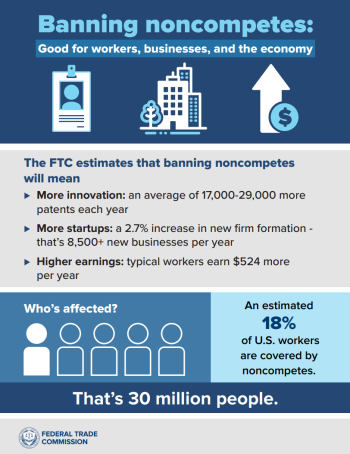The Federal Trade Commission (FTC) has banned non-compete clauses for employers and workers, and in many cases, the ban applies retroactively.
Here’s what dermatology employers employees and other healthcare providers need to know:
- The new ban is slated to take effect in 120 days from April 23, 2024.
- The ban does apply to staff in nonprofit hospitals and health systems.
- The ban could affect employment decisions among people hiring or considering working for private or private-equity-backed dermatology practices.
As many as 45% of physicians are affected by noncompetes, according to the American Medical Association. “I would first advise all practices to consult with their attorney for additional details,” says Mara Shorr, a consultant at Brinson Anderson Consulting, Inc. “There are certain loopholes in which certain entities would be exempt and for the final ruling on the passage of this ban.”
- Protecting your assets and controlling the narrative is key.
When a team member does leave your practice, implement a strict procedure for changing passwords/locks/keys immediately and manage the message about a team member’s departure proactively instead of reactively. "Reach out to all patients to keep them on your practice's schedule and introduce them to another provider in your office instead of letting enough time go back if they choose to follow the newly departed provider to their new location.”
- The ban could raise wages.
The new rule could boost wages by a total of nearly $300 billion a year, by forcing companies to compete harder for talent, the FTC notes.
- Existing noncompetes can remain in force for senior executives who earn more than $151,164 per year and are in a “policy-making position.”
- Existing noncompetes are no longer enforceable among other employees.
- Noncompetes tied to the sale of a business are still allowed under the new FTC rule.
- Not everyone is on board with the ban.
The U.S. Chamber of Commerce is planning to sue to block the ban from taking effect. “The Federal Trade Commission’s decision to ban employer noncompete agreements across the economy is not only unlawful but also a blatant power grab that will undermine American businesses’ ability to remain competitive,” the group stated in a press release. This is likely the first of many lawsuits.
- This ban could be problematic for smaller practices.
"When breaking on a new Dermatologist, it's a big investment for a smaller practice, and if they can leave anytime [and open up] across the street that would hurt one or two practitioner practice," says Kim Campbell, Founder of the Dermatology Authority, which provides dermatology providers and businesses growth strategies. "They would end up taking a large percentage of the patients from that practice."
- The new ban does not prohibit other types of restrictive employment contracts such as nondisclosure agreements and nonsolicitation agreements. “Outline what is included in a non-solicitation specifically,” Shorr advises.
- Compensation-based agreements such as garden leave and severance agreements are generally not prohibited under the new rule as long as there are no restrictions on what an employee can do after they are no longer employed,
- The new FTC rule will supersede any state statute. State laws that are more stringent than the FTC’s rule will still apply.
- Taking good care of your employees still matters.
“The best way to keep providers and employees/independent contractors inside their practices are to treat them with fairness and respect, maintain proper processes and protocols, and pay each team member fairly,” Shorr says. “I often recommend paying them above market value with above average paid time off." When hiring, focus on what you can do for that employee instead of what you can no longer do, she says. “This includes appealing bonus structures, skincare commission, above average paid time off, paid insurance policies and CME, and more," she says.


